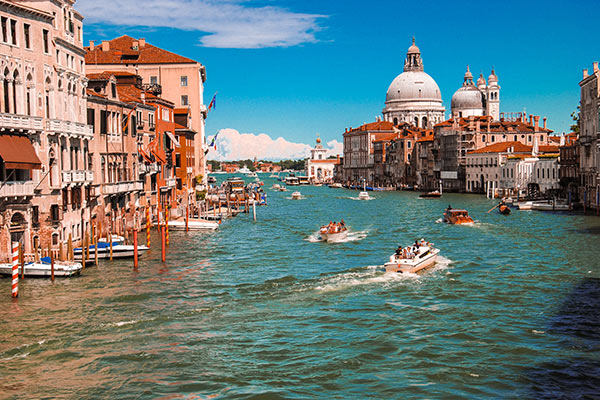
Getting an EU Work Visa as an American Expat: Everything You Need to Know
More and more Americans are exploring the option of living abroad thanks to advances in technology that can allow them to work and stay connected while overseas. Remote work has become a more popular way to make a living, and many people are using this flexibility to move abroad. European Union (EU) countries are some of the most popular destinations for these permanent and semi-permanent tourists.
If you’re considering a move across the Atlantic, it’s important to consider how you’ll continue making a living. If you’re going to live in a European country for any length of time, you’ll eventually have to get an EU work visa to keep earning money. At WorldSmart Association, we help Americans and other expats transition effectively to living abroad. In this article, we provide answers to many common questions about getting a visa to work in the EU.
Who Needs a Work Visa in the EU?

The U.S. has signed agreements with the EU which allow Americans to work in any of the EU member states. Unlike citizens of countries without such agreements, Americans can visit the EU for up to 90 days without a visa for business or tourism purposes and can even search for employment during this time. If offered a job, they can apply for a work permit or visa while still in the EU. It is worth noting that the application process and timeline for obtaining a work permit may vary depending on the specific country of residence, as each of the 27 individual EU countries has its own visa requirements for Americans.
The Schengen Area is a group of 22 EU countries and four non-EU countries that have implemented stronger security measures at their external borders. However, this also means that people and businesses can move freely within the region without border checks. Visitors who enter the Schengen Area can travel within the region without additional visas. In most cases, a Schengen visa will suffice for traveling within EU member states. The only exceptions to this are Ireland, Bulgaria, Romania, Croatia, and Cyprus, which are EU members but not Schengen members.
How to Get a European Blue Card
Although different EU countries don’t adhere to all the same work visa rules, the Blue Card system offers something of a shortcut for qualified professionals. Under the Blue Card system, an American can live and work in an EU country as long as they meet a specific set of qualifications. Denmark and Ireland are the only two EU member states that don’t use the Blue Card system. If you want to apply for a Blue Card, you’ll need:
- A degree from an institution of higher learning (most countries also accept five or more years of professional experience)
- An offer of employment in an EU country that provides a high salary, in most cases, at least 50% greater than the local average
- Work as a paid employee rather than as an entrepreneur or self-employed worker
- All relevant travel documents, including a valid passport
- Insurance for you and anyone traveling with you
- A work contract of at least one year in your destination country
- Legal qualifications to practice in your field if it’s regulated
If you meet these requirements, you can apply for a Blue Card through the immigration office of your destination country. They’ll review your application and respond to you within 90 days. If you think the Blue Card might be an option for you but still have questions, you can review some FAQs on the official EU Blue Card site.
How to Get an EU Work Visa

If you’re not in the running for a Blue Card, never fear! You can still apply for residency and a work permit in your destination country. The exact process for this will vary for each country and depend upon your personal qualifications. Since the application processes are so diverse, it’s impossible to describe them all here in complete detail. However, here are the primary things that you’ll need to apply for a work visa in most EU countries:
- Two identical passport-style photos taken within the last three months
- A valid passport
- Proof of accommodation in the destination country
- An application form, which can vary based on the country you’re traveling to
- A contract between you and your future employer
- Proof of travel insurance, covering up to 30,000 euros as well as travel to the U.S.
- Demonstration in the primary language of your destination country
- All diplomas, professional certifications, and other documentation that prove your professional credentials
Before making your travel plans, be sure to get in contact with the immigration office in the country you’re traveling to. Their officials will be able to tell you about work permit requirements and any local variations in procedure.

Frequently Asked Questions
Getting a visa in Europe can be challenging, and you may still have plenty of questions. Here are some answers to the most frequently asked questions about working in EU countries:
Can You Work in the EU on a Student Visa?
If you’re studying abroad in Europe, you’ll have to obtain a student visa that grants you certain privileges while you’re in school. Individual countries issue student visas, and the exact terms can vary. Most will allow non-EU students to work, although their maximum number of hours is usually limited.
For example, if you have a student visa in France, the maximum number of hours you can work is 40% lower than the general public, according to Campus France. This works out to 964 hours per year. In contrast, if you’re in Germany, you’re permitted to work a total of 120 full days or 240 half days before applying for a work permit.
Do I Need a Visa to Do Volunteer Work in the EU?
If you’re hoping to participate in a volunteer program within an EU country, you usually won’t need anything besides a tourist visa. Once you pass through customs at the airport, you’ll be fine to volunteer for up to 90 days. After that term expires, you’ll have to follow the visa requirements of the country you’re working in. While expats may be able to do visa runs in other areas of the world to “restart the clock” on their visas, the Schengen Area gives you only 90 days to spend there within any six-month period.
Can I Work in the EU on a UK Visa?
The U.K. is no longer part of the EU, meaning that it has its own system of granting visas and work permits. If you have a work visa in the U.K., you’ll still have to go through the normal steps required for residency and work permits in your destination country.
Can You Work in the EU on a Marriage Visa?
If you’re an American married to an EU citizen, you’re in a much different position than most. If you both want to live and work in your spouse’s country of origin, all EU member states allow you to do this, providing you present proof of your marriage and have the proper travel documents. Depending on the country you’re planning to move to, there may be additional immigration hurdles for you to cross before settling in.
Can I Work as a Nurse in the EU?
In general, working as a nurse in Europe follows the same guidelines that apply to other fields. You’re generally free to work as a nurse, provided you have documentation of your license and education. This is vital since nursing is a regulated profession in both the U.S. and the EU. Some EU countries have slightly different requirements, so be sure to do your research before making any plans.
Why Should I Work in the EU as an American?
Europe can be a fantastic place to work as an American expat with many safe countries, both relatively expensive and less expensive. Whether you’re going to further your professional goals or simply to enjoy the scenery and culture, your experience is sure to be rewarding. Here are some of the main reasons you should consider working in Europe:
Work-Life Balance
Whether you love it or hate it, as an American, you’re part of one of the most overworked populaces on the planet. While many Americans find value in their careers and live comfortable lives, this approach to work is rare in EU countries. If you’re looking for a place with a better work-life balance, then any number of European countries might be the ticket. Employees in the EU generally receive much more vacation time and work shorter hours. While many Americans work more than 40 or even 60 hours a week, the European average is generally below 40, with the average dipping below 30 in some countries.
Culture
Living in another country is a fantastic way to broaden your horizons. If you get the opportunity to work in an EU country, you’ll get to soak up the surrounding culture every day. You’ll get to taste new food and drink, see famous historical sites, and most importantly, learn a new language. This can make you a more well-rounded person as well as a better employee. With every great change comes potential challenge, such as culture shock, so ensure you are mentally preparing for the change. You can start with these helpful tips for dealing with culture shock.
Wrapping It All Up
That’s a quick review of how you can obtain a work visa in the EU. At WorldSmart Association, we offer a wide range of resources to help people from the U.S., U.K., Canada, and Australia relocate and pursue more fulfilling lives abroad.
If you’re interested in making your travels easier, more affordable, and more rewarding, consider joining WorldSmart. You’ll get access to an extensive network of other travelers who would love to help you make your dreams a reality. You’ll also receive global insurance for protection wherever you are .








